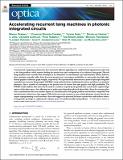Accelerating recurrent Ising machines in photonic integrated circuits
Author(s)
Prabhu, Mihika; Roques-Carmes, Charles; Shen, Yichen; Harris, Nicholas Christopher; Jing, Li; Carolan, Jacques J; Hamerly, Ryan M; Baehr-Jones, Tom; Hochberg, Michael; Ceperic, Vladimir; Joannopoulos, John; Englund, Dirk R.; Soljacic, Marin; ... Show more Show less
DownloadPublished version (3.660Mb)
Publisher Policy
Publisher Policy
Article is made available in accordance with the publisher's policy and may be subject to US copyright law. Please refer to the publisher's site for terms of use.
Terms of use
Metadata
Show full item recordAbstract
© 2020 Optical Society of America under the terms of the OSA Open Access Publishing Agreement Conventional computing architectures have no known efficient algorithms for combinatorial optimization tasks such as the Ising problem, which requires finding the ground state spin configuration of an arbitrary Ising graph. Physical Ising machines have recently been developed as an alternative to conventional exact and heuristic solvers; however, these machines typically suffer from decreased ground state convergence probability or universality for high edge-density graphs or arbitrary graph weights, respectively. We experimentally demonstrate a proof-of-principle integrated nanophotonic recurrent Ising sampler (INPRIS), using a hybrid scheme combining electronics and silicon-on-insulator photonics, that is capable of converging to the ground state of various four-spin graphs with high probability. The INPRIS results indicate that noise may be used as a resource to speed up the ground state search and to explore larger regions of the phase space, thus allowing one to probe noise-dependent physical observables. Since the recurrent photonic transformation that our machine imparts is a fixed function of the graph problem and therefore compatible with optoelectronic architectures that support GHz clock rates (such as passive or non-volatile photonic circuits that do not require reprogramming at each iteration), this work suggests the potential for future systems that could achieve orders-of-magnitude speedups in exploring the solution space of combinatorially hard problems.
Date issued
2020-05Department
Massachusetts Institute of Technology. Research Laboratory of Electronics; Massachusetts Institute of Technology. Department of Physics; Massachusetts Institute of Technology. Institute for Soldier Nanotechnologies; Massachusetts Institute of Technology. Department of Electrical Engineering and Computer ScienceJournal
Optica
Publisher
The Optical Society